Text
On the limits of experience and reason (or, another take on the culture wars that you didn’t ask for)
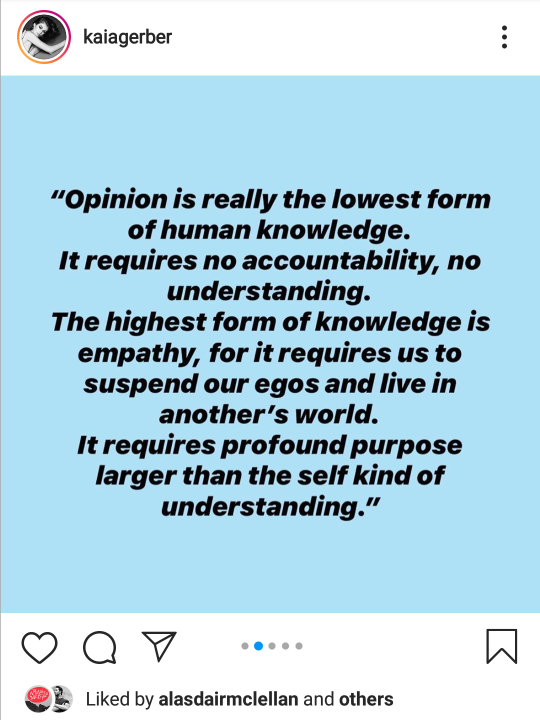
In her book The Human Condition, Hannah Arendt explains the etymology of the word privacy. In ancient feeling, its meaning was indicated in the word itself: it had to do with privation; it literally meant a state of being deprived of something. Slaves and women were relegated to the private sphere because they were deprived of the opportunity to participate in public life.
I recalled this recently as I was re-reading 1 Timothy 2. This is a passage many Christians have been embarrassed by, but which, when considered in light of the Roman sensibilities it would have offended, was extremely radical for its time. After all, for a woman to learn implies that she must participate.
If this cultural moment has taught us anything, it is that who learns is just as significant as who is able to teach. In fact, I would suggest that given the preoccupations of our time, this text remains radical.
I say this because education as a rallying cry has been taken up to great effect by the left. I share articles on my Facebook page regularly, and although I do so for the purpose of educating myself and anyone who chooses to read along with me, it never occurs to me to caption the article with ‘educate yourself.’ It is curious to me that this sort of rhetoric accompanies certain kinds of knowledge shared by certain people. Generally, this knowledge is informed by personal experience. It has been argued, not least by the signatories of the letter published in Harper’s recently, that this knowledge is being used and abused to shut down open debate.
I think that experience has become the highest epistemic authority for the left because it is universal knowledge (in the sense that it can’t be bought, nor does it require a certain level of education), and therefore, everyone has access to it. If this knowledge is recognised as authoritative, it has the ability to bestow power, even to the least (of course the trouble is, what makes this knowledge so accessible is also what makes it so exclusive).
I also wonder whether a purely logical and scientific approach to the world may have generated a backlash. Sure, reasoned argument is helpful and good, but funnily enough, it does not encompass all of human experience. Perhaps our knowledge is not limited to what we can see and the next generation is overcorrecting this philosophy. Or perhaps it’s bad parenting. Whatever. The circle keeps going round.
However naively for my part, I don’t feel a sense of alarm when I consider the culture wars because wherever one sits on the political spectrum, the measure of all things is still man - whether according to experience or to reason. I like to remember that the Bible tells us not to put our trust in princes, whether they come to us as resistance fighters of the new establishment or as defenders of classical liberalism.
I’ve told anyone who will listen that I’m not the biggest fan of Douglas Murray’s The Madness of Crowds, but there were certain things that stood out to me. In his chapter on race, Murray draws attention to extreme examples of cancel culture, one example being the cancellation of the professor Bret Weinstein at Evergreen college. Murray recalls for us a situation in which Weinstein was accused of racism and attacked by hysterical students (most of it caught on film):
Weinstein tried to point out that there is a difference ‘between debate and dialectic’. As he said, ‘Debate means you are trying to win. Dialectic means you are using disagreement to discover what is true. I am not interested in debate. I am interested only in dialectic, which does mean I listen to you and you listen to me.’
This suggestion did not go down well with the assembled students. ‘We don’t care what you want to speak on,’ one young woman screamed at Weinsten as he held his hands on his head. ‘We are not speaking on terms of white privilege.’ Others barracked and shouted as the general mood got uglier. ‘This is not a discussion,’ one student yelled. ‘You have lost that one.’
I take it that one is supposed to read this and be horrified. I read it and I was fascinated. I was fascinated because I was struck by the limits of human reason. There was nothing this Professor could say in order to placate these young students - his path to salvation was not theirs, and he had no higher authority to appeal to. Reason was not enough.
Don’t get me wrong, I am saddened to read that the next generation of young people are ill-equipped to put forward reasoned arguments with a sympathetic professor in the hallowed halls of a university. However, perhaps it is not entirely to the disadvantage of the Christian that the weakness of these institutions is exposed to a wider audience. And perhaps it’s a weakness that predates cultural Marxism?
Once upon a time, the greatest institutions of learning were built on Christian foundations for the purpose of genuine education, but those purposes have long since been lost. Hubris in the form of secular humanism infected academia long ago, well before the rise of the ‘new religion’. Christians may be joining hands with the likes of Richard Dawkins now to decry the degeneration of discourse, but we have short memories if we cannot remember the mockery levelled at us in the form of the flying spaghetti monster.
So, what then? Retreat? Well, no. I’m just trying to point out - I don’t think the Christian necessarily has a comfortable affinity with any side of the spectrum, and indeed, I think we have far more to offer. I think there is a time and place for advocating for black lives, or for freedom of speech. These are issues that Christians care about, and I think there is freedom for them to pursue the causes that move them. But I think all of us should do so remembering that as Christians, we are not at home. This is not our world, not our language. Where the experience of the left and the reason of the right fail, Christians hold out an integrated and holistic knowledge of God, the world, ourselves.
Since I’ve tried to justify the observation that each side of the culture wars is hamstrung by limited knowledge, I’ve been thinking about how it is I know that the Bible is true, and the circumstances in which it is taught to me. As I’ve reflected on these things, I have found great comfort in my local church, which conducts itself so differently to the noise online and in the world. I’ve been grateful for God’s word to me, expressed in his Son, and for the qualified men of character who teach it to me with all humility. It is clear that most people in our world are afraid of losing their power. The men of the church, if they are worth their salt, spend all of their time actively trying to divest themselves of it.
Each week, the one who preaches in an evangelical church does so with the aim of educating (to put it very simply) the ones in their care. And this preaching is done within the framework of revelation. This means that the knowledge we receive is only mediated to us by the teacher who is just as beholden to the words of God as we are. In fact, he is in a far more precarious position because it is his job to demonstrate that he has rightly handled the word of God. He is accountable to his congregation members, and ultimately, to God himself. This is why it is no small thing to learn. It is also why I do not begrudge the injunction to teach. What happens in the pulpit has nothing to do with the glory of the speaker, and everything to do with the glory of God.
Perhaps it is anti-climactic to spend all of your time dwelling on theories of secularism only to find that the Christian’s main task hasn’t changed in the slightest. I’m not sure why we keep raising new questions about what evangelism looks like in our changing world, as though the fact that the gospel never changes could be anything other than our greatest strength.
1 note
·
View note
Text
On knowing your own mind
On an episode of The Drum on August 20, feminist writer Jane Caro could hardly contain herself. The source of her distress was the Managing Director of the Women’s Forum Australia, Rachael Wong. Wong had the gall to suggest that it would be prudent to legislate informed consent for women seeking abortions. In response to Wong’s view that a woman seeking an abortion ought to be made aware of alternatives and referred to counselling, Caro shot back:
“Having had an abortion, and having known my own mind, and being perfectly capable of doing the research myself… had any doctor tried to speak to me that way I would have told them to pull their head in. I was a grown woman when I made that decision. We are perfectly capable of making intelligent judgments about our own bodies... It is incredibly disrespectful to have our rights over our own bodies dissected and discussed… It is up to women themselves….”
If Caro could hardly contain her anger at Wong’s suggestion, I can hardly contain my incredulity at her response. A large part of Caro’s journey to abortion was her ability to access and understand information regarding the procedure before she went through with it. In her words: she knew her own mind.
When Wong suggests that informed consent ought to be a necessary step towards abortion, she is in a sense agreeing with Caro. The aim of building informed consent into the process is to ensure that every woman who goes through with an abortion can say with some degree of confidence that she did in fact know her own mind.
There is no doubt that Caro is ideologically committed to abortion. It seems that she had reconciled herself to the option long before it became a personal reality. But what I would like to ask Caro is, do you really believe that your understanding and experience of abortion is universal to all women?
It is profoundly ironic to me that women like Caro, who are so ready to propound the feminist idea that middle class white men are incapable of perceiving their privilege, do not recognise their own privilege in this instance. To suggest that every woman who unexpectedly falls pregnant has had the same mental and emotional resources to adequately process her options prior to the event, let alone in the midst of it, by herself, is absurd.
“Having known my own mind and being perfectly capable of doing the research…” That kind of self-knowledge and capability is overwhelmingly the fruit of university education and a general condition of stability. And where even the most stubbornly thought through woman is concerned, unexpected pregnancies can, and do, have a disarming effect.
The fragility of a woman’s mental state during and after pregnancy features heavily in one of the court rulings that has tempered the scope of the Crimes Act 1900 (NSW) as it relates to abortion. In CES v Superclinics Australia Pty Ltd (1995) the Court of Appeal ruled in favour of the appellant who wished to claim damages against Superclinics for failing to diagnose her pregnancy early enough for her to procure a legal abortion. Essentially, the woman sued for ‘wrongful birth’ (an expression that is now standard legalese).
The Judge in the original case ruled that any instance of abortion would have been unlawful for the woman since there was no evidence that her life, or the life of her child, was in any way threatened. However, the Appeal ruling widened the scope for lawful abortion by taking into account the mental state of the woman.
The Appeal found that the social and economic circumstances of a woman may be adversely affected by bearing a child, even a healthy child, resulting in the deterioration of the new mother’s mental health. Conveniently, the Court ruled that the full extent of such mental deterioration could not possibly be known until after the child was born. From this ruling on, a termination could be declared lawful on the grounds that it would protect the mother from any ensuing mental harm.
Perhaps the mother in this case was cut from the same cloth as Caro – a woman who had come to a clinic having already known her own mind. The facts of the case recall a woman who wanted an abortion, certainly. But they also recall a frightened and anxious woman. Even the most resolute of women navigate this space in a sort of fearful haze.
The Reproductive Health Care Reform Bill sets the bar for informed consent far too low. Firstly, it does not provide any grounds for evaluating whether or not a woman has given informed consent. For example, the Bill makes no explicit provisions for the woman to be advised of her options. Further, whether or not a woman is referred to counselling is entirely at the discretion of her medical practitioner. In an instance where a couple have fallen pregnant with a child with Down’s Syndrome for example, it seems highly unlikely that such a couple would be referred to counselling prior to abortion. Prevailing consensus amongst the medical community is that this baby should not be brought to term. What provisions will be made for a couple in situations where the medical practitioner has already decided that abortion is the best course of action? This is an utterly perverted expression of ‘choice.’
The women who ‘know their own minds’ when seeking abortion will not be at a disadvantage if offered clear options for informed consent. However, these same women who speak loudly into the public sphere about how ‘disrespectful’ it is to be given options, do a grave injustice to the women for whom these services may be, quite literally, a lifeline.
No woman will be prosecuted again in this state for procuring an abortion from a medical expert (and I don't advocate that they should be). Since the Superclinics ruling, the scope for abortion effectively provides for a prospective mother to terminate a pregnancy on the grounds that the child may prove to be an inconvenience. It paved the way for the belief that giving birth to an unwanted child is the unconscionable act, over and above the killing of that life.
In my own (short) lifetime I have seen monumental social change and yet nothing has prompted me to action like this. For the first time, I have organised my community on political matters. For the first time, I have organised to meet with my MPs. For the first time, I have called multiple members of Parliament in one sitting. For the first time, I have rallied with strangers to protest against the government of the day.
I do this because I believe that this is the final proof that our society as a whole has been taken in by an abhorrent view of morality. We believe that what is pleasurable and convenient is to be preferred to what is right. We do not have the moral imagination to find any meaning in suffering, we do not believe that sacrifice could be a form of strength. And so we pass over children who may be born with defects. We do not try to genuinely aid a woman who may wish to abort her pregnancy for no other reason than it may interrupt her life trajectory. We do not try to create a society that is guided by compassion, rather we run wholeheartedly with the Darwinian notion that every woman must fight for herself. If a woman feels she must terminate her pregnancy because the social and economic cost is too great – that is an indictment upon society. It is not the kind of society I wish to cultivate.
It has long been said that the law is consistently playing catch up with changing social mores. When it finally changes, it is said to reflect views that are widely held and deeply felt. In this instance I say firmly: not I.
0 notes
Text
When my husband and I got married, we chose Revelation 21:1-7 as the passage to be preached. For those who are familiar with it, to stop at verse 7 is to make a glaring omission. For after describing the glorious vision of the new heavens and the new earth, verse 8 issues a stark warning:
“But as for the cowardly, the faithless, the detestable, as for murderers, the sexually immoral, sorcerers, idolaters, and all liars, their portion will be in the lake that burns with fire and sulfur, which is the second death.”
We made this omission because we were thinking about who would be in the crowd. We were thinking about our non-Christian friends and family. We were thinking about how to preach the gospel in terms accessible and loving to them. But in the past few weeks I have come to the shameful realisation that we made the omission because we were cowards.
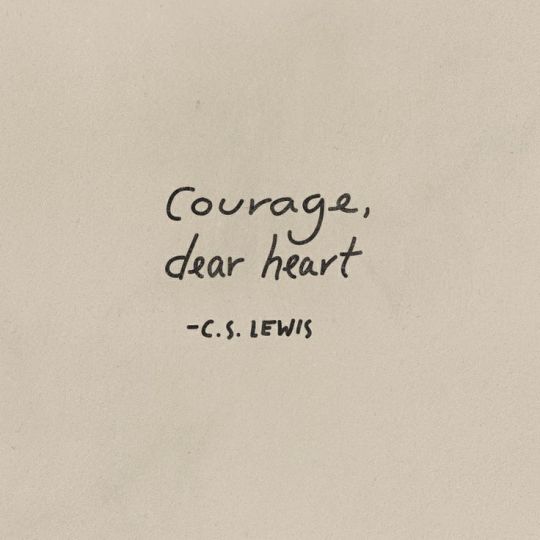
I have not re-visited that decision because until now, I have been able to safely rationalise verse 8 away under the guise of ‘loving accessibility’. Perhaps you are unsettled that a good Moore College graduate could ever have been party to such a decision (to be fair, this was pre-Moore, lest I bring the evangelical fervour of my chosen theological institution into disrepute). If so, you are more faithful men and women than we proved ourselves to be. But at the time, we honestly believed that it was the most loving way to preach the gospel. Or at least, that’s what we told ourselves.
What does it mean to love? What does it mean to hate? These words, love and hate, have come to mean such different things to the people who use them. At least, I know that when I speak of love and hate, my theology shapes my use of them. To this end, when I speak of ‘love’, it is often heard by my secular friends as a form of ‘hate’. If this doesn’t signal a breakdown in language, I don’t know what does.
There is a certain complexity to the nature of Christian love that our society no longer has the moral imagination to grasp. Although, at one level, it has been understood. I have seen the exasperated articles and comments that point out that it is a paradoxical move to condemn to hell those you purport to love. But rather than questioning how or why this could be possible, Christians are dismissed as though we have simply passed over the question for two thousand years.
Society’s moral imagination fails to grasp the paradoxical nature of Christianity for many and varied reasons, not the least of which is because, well, God intended it. But on my little piece of the Internet with proper recognition of my finitude, I will humbly offer the commentary that the pleasure/pain paradigm which dominates our society’s worldvew is too simplistic to comprehend it.
In his Essay Concerning Human Understanding, John Locke defined good and evil with reference to pleasure and pain. This is a rational move for it is demonstrably true that harm causes me displeasure and pain, which is evil. Therefore ‘the thought of pain, which any thing present or absent is apt to produce in us, is what we call hatred.’ In the same vein, I love that which increases my delight, which increases my pleasure, therefore ‘anyone reflecting upon the thought he has of delight, which any present or absent thing is apt to produce in him, has the idea we call love.’ Therein we also find that which is good.
For all of our movements and post movements since the Enlightenment, I don’t think we have evolved much beyond Locke’s definitions. For if the cross of Christ does not determine the nature of good and evil, and love and hate, then they can only be decided with reference self. Although this has been revealed to us definitively, Christians continue to analyse our secular culture with the fervour of doomsday preppers, as if the sinful human heart of our cultural zeitgeist is fundamentally different to that of any other.
If we follow Locke, as I believe secularism has, then what constitutes love and hate are self-determined. The emotional response that we so often criticise has been rationally justified. From this vantage point, it is little wonder that Israel Folau’s recent post could be conceived of as hate speech by the LGBT community. After all, this same community was recently fighting against the denial of a pleasure-inducing good, namely, marriage. The fact that it has now been won doesn’t mean that this same community will come quietly. Homosexuality was not fully decriminalised in Australia until 1997 when Tasmania finally followed suit. While there have been many gains for the LGBT movement in recent years, there has also been a lot of historical pain. It won’t easily be forgotten. As such, the LGBT community couldn’t help but read Folau’s post through that lens. On this point, Locke has some insight: “we extend our hatred usually to the subject which has produced pain in us, because the fear it leaves is a constant pain… we do not so constantly love what has done us good, because pleasure operates not so strongly on us as pain.”
The problem is this.
I do not believe that Israel Folau hates the LGBT community. Admittedly, I do not know him personally so I could be wrong about this. However, I can speak for myself. As a committed Evangelical Christian, I say in all honesty that I do not hate the LGBT community. Yet, I believe what Folau posted.
The stunning irony is that I have used the biblical teaching with regards to hell to challenge people on their homophobia. I have also seen Christian ministers do the same. I remember on one occasion seeing a congregation member stand up at the end of a sermon on Christian sexuality to challenge the Minister because they felt that he ought to have been more condemning of the LGBT community. To this end, the person demanded that the Minister read out Romans 1 (another passage that one would rather not have read out at their wedding). In response to this public challenge the Minister only said in return: “this passage, my friend, is about you.”
That Christian love should be exemplified by a tortured, beaten, and bloodied body nailed to a cross in order to save sinners from hell is an impossible contradiction. And that is exactly the point. Christian love must preach both sides of the coin. The message utterly degenerates without it, as one writer recently observed. But society is no longer familiar with the kind of dutiful sacrifice that signifies genuine love. We are comfortable, we are entitled, and we will not have our lives encroached upon by anything so unpalatable as hell. Our values do not extend beyond buzz words like ‘representation’, or ‘diversity’ and we have so debased the language of human rights that it’s hard to feel as though anything is really sacred. So much for human understanding.
And yet, we still bear the marks of the divine, even now. The sleepless nights of a new mother, the careful discipline of a father, the forgiveness borne by a friend – these things testify to us that what is truly good in fact involves some element of self-denial, even pain. It is undoubtedly painful to hear that one is going to hell. The night I realised the extent of my own sin I fell to my knees and cried for a long time. I cried openly because of the weight of my guilt. But more than that I cried because I understood what I was saved from and by whom. I cannot adequately describe it, but if I had to put a word on exquisite pain mixed with deep gratitude I suppose it would be joy.
Again, I say to my own shame that it has taken me almost 6 years to return to my wedding day to reflect on the passage that we chose. That such a sentiment has been provoked in me by a football player with whom I have fundamental theological disagreements, actually brings me some delight. When I left Moore College, I left with some degree of pride, even though I am a third rate theologian and about as effective as an evangelist. I have had three years of theological training but it took one Instagram post from a man of simple faith to give me a much needed boost of courage in order to preach it. There are all sorts of conversations that could be had about whether Folau expressed himself adequately (can I just say that if you’re going to take him to task for this, I’d like to see you do the same with Jonathan Edwards), or whether he is genuinely Christian given his heretical views on the Trinity. And yet, while we theorise amongst ourselves, who, I ask, is preaching the gospel? Little wonder God has sought to use a football player with no knowledge of Greek or Hebrew to put hell on society’s agenda.
As for me, I can only extend an apology to my non-Christian friends and family that on my wedding day, I did not see fit to warn them about hell. I can only hope that in future I have the courage to love people better.
0 notes
Text

Photo by Peter Lindbergh
Between the chip on my shoulder, penchant for admiring women who exile themselves for their opinions (Hannah Arendt, Camille Paglia, Helen Razer), and my general evangelistic zeal, it’s no wonder that everything I say seems blandly combative. Feminism is bad. Intersectionality is a false lead. The Christian blogosphere is lukewarm. The Babylon Bee is for dudes who anonymously write out their rants and call it ‘satire’. Sheesh. I’m not exactly the blogger you look to for a dose of optimism. Perhaps there is something endearing in that, but perhaps I need to re-think the way I see the world. Who better to help get me on the right track than Emma Watson?
Despite being critical of liberal feminism (the kind of nice, popular feminism about women having ‘choices’ which probably has too close a relationship to capitalism) which Watson is undoubtedly a face of, I still admire her. I mean, who doesn’t love this woman. As if being Hermione wasn’t enough, she is Ivy-League educated, and is genuinely committed to her feminist convictions and the belief that they can make the world a better place. She would never be accused of naysaying. My respect for her manifested itself in my spending $8.99 on Vogue Australia this month, which she guest-edited.
From her editor’s letter, to her reflections on ethical fashion, to her conversation with Malala Yousafzai, Watson overflows with optimism. Although tbh, I kind of want to start a whole naysaying thing right here about the alienating effect of waxing lyrical about sustainable fashion when very few people can actually afford it. But I won’t.
I don’t think I’m a better person for having read this month’s woke issue of Vogue. But I couldn’t help noticing how differently Watson and I approach the world. She gains our trust because she seems to be earnestly moving forward towards something better. In contrast, I wonder whether I am destined to merely criticising the movements she holds so dear for the rest of my life. Can I do better than this and instead offer a vision of life with the same optimism and enthusiasm as Watson? Where do I start?
I have studied the Mark 8 call to discipleship more times than I can count. It is a polarising text which sets out the bottom line of the Christian life and even after all these years, I struggle with it. Mostly, I keep forgetting what it means to deny myself as a follower of Christ. I forget what it means when I consider myself to be a leader rather than a slave. I forget what it means when I worry more about whether my voice is being heard, or my gifts are being appreciated, than getting on with unseen service. I forget what it means when I begin to resent the choices that I’ve made because I realise that in the eyes of the world, they mean that I amount to nothing.
If anyone would come after me, let him deny himself and take up his cross and follow me.
Watson’s Vogue is great, it’s just, I can’t imagine the usefulness of pressing it into the hands of the majority of the world. But Mark 8 confronts everyone regardless of their situation and tells them to choose Jesus and wait in hopeful expectation for him. There are few solutions that our world can come up with that can muster that kind of universality. But it’s not exactly a palatable option. According to the Christian, in order to fully realise your humanity, it seems as though you have to deny a fundamental part of it: your autonomy.
In denying myself, I’m lightyears behind the successful optimists of our world. Instead of being some kind of #girlboss, I find myself playing duck duck goose with infants of a Friday morning, while their mums read the Bible together, at the church in the home town that I never left. In this instance, I’m technically not even using the ‘gifts’ I supposedly developed at theological college. And more than that, I’m led to believe not only by the secular world, but at times by Christian sisters, that helping with crèche is to be relegated to the sphere of unpaid, menial labour. I can’t understand that mentality. I really can’t, and I think it’s because I have internalised Mark 8 rather than resistance towards the patriarchy. If I live my life according to Mark 8, then the idea that caring for children could be beneath me just sounds like a load of entitled, selfish nonsense. I am a slave. That is all I am. Nothing more. That’s not exactly a platitude you will see on social media for International Women’s Day.
The truth is, I have a lot to offer. More to offer than Emma Watson. But the thing about carrying a dirty great cross is that it is not particularly photogenic. And whatever else Watson may stand for, she still has to sell movies, magazines, clothes… She is part of a machine that must always remain optimistic, because without that, we wouldn’t be tempted to think that we should buy a piece of it. Or many pieces.
I can’t buy the hope that Jesus offers. It costs too much. His own blood, the denial of self. In many ways the gospel itself ends up naysaying the world and I’m just the messenger. But I suppose I have to remember that it naysays with the promise of something far greater. Criticism without hope is just bitterness. I may be a slave, but the Bible promises joy in service and I tell you, truly, even though I am the girl least likely, I really love those crèche kids.
0 notes
Text

Image by Annya Karina
I’m trying to understand why a place like Lost in Books is creating so much angst in me. In theory, it represents everything I’ve ever wanted to see in Fairfield: people appreciating the diversity of the city, investing in it, and wanting to hear and share the stories of the people. To have a successful curator establish a community project in our area seems like exactly the kind of validation we would want and need.
And yet, when I walked into the beautifully designed space that is Lost in Books in downtown Fairfield, I did not feel validated. It was an odd reaction because I felt a sense of validation when Campos Coffee shops opened up. I felt validated when the Sydney Film Festival started to host screenings at Casula Powerhouse. I welcomed these cultural developments because they made me feel like South West Sydney was changing in my favour. Everything I had to travel out of the area to find was finally coming to me.
I used to make jokes about the South West eventually becoming like the Inner West, but there was a genuine wistfulness behind it. I thought I wanted good cafés and art on my doorstep. But as it begins to come to life around me I am not as excited as I thought I would be. I am resentful.
I sit at the small table with a group of mums and we embroider for fun, hoping that women from the community will join us. We don’t know how to tell others about it, but we sit and we wait, hoping that somebody we haven’t already met will appear. It’s a familiar feeling.
As I sit at this table and make small talk, I notice someone walk in and I can immediately tell that she isn’t from here. She wears a denim jacket over a vintage inspired mini-dress. She carries a calico bag and her long dark hair is fashioned into a side plait. Also, she is white. She walks around the book store and my eyes follow her. I want to know who she is, why she is here, how she knows about this space. I try to gesture to my friend… invite her over, I say. But my friend is shy. I smile. Ok.
I stand at the counter with my embroidery and casually strike up conversation as she comes over, ready to buy a book.
“My friends and I are embroidering, would you like to join us?”
“Oh I would love to, but I can’t. I actually work across the road at SSI and I have to get back.”
“Oh cool, do you come here much?”
“Yes, I work with Jane and Yvonne and we reach out into the community to tell people about it. We work with community leaders and they help us to get the word out.”
“Wow, how do you do that? It’s always seemed tricky to me to break into the Fairfield community. It’s so insular. How do you find community leaders?”
“Oh, they’re sometimes self-identified and we just get alongside them. We find people through our programs and services. I’m quite new to my role.”
“Ok, well, maybe you can meet my friend who has started this creative group, we’re hoping that more women will join us.”
It takes a while for the purchase to be processed. I sit back down and wait.
I overhear the conversation between the social worker and the woman behind the counter. Lost in Books hires people from ‘marginalised’ communities and the sales assistant is a middle aged woman who is still learning the ropes of the store.
“Have you filled out the form for the Ignite program?”
“What is the program? I don’t know what it means.”
“It will help you. I think you have good ideas, you should do this.”
“I don’t understand, I can’t read the form, can you help me?”
“I can’t, but…”
I sigh inwardly. She eventually comes over to chat to us.
“Your program meets our outcomes. I’ll try to let people know about it, but I can’t promise you anything. I’m mostly based in Ashfield so I’ll see how I go.”
She’s cool. They’re all cool. They’re just... not ever from here.
Later that afternoon I decide to stay. I can’t help it. I feel the need to say or do something on behalf of the people who love Fairfield and can prove it because they damn well live here. She brings me a glass of hot lemon tea and I sit at her feet and I ask: what is your story. Tell me your story.
When I pick up on my cue to leave she says, I hope you always come and help put the books back on the shelf.
I go home and I Google Lost in Books for about the third time. Who are you and why are you here? I watch clips describing the process. A profile in the Guardian appears. I watch and I read and I cringe.
I cringe because there is a bookshop in Liverpool Westfields and it is called QBD Books. I cringe because there are books in Fairfield, it’s just that people go to the library to access them. I cringe because I know that women aren’t on the street because they don’t want to be. They stay home, they visit family, they are extraordinarily insular by choice as much as handicap. I cringe because it seems as though this store is solely responsible for introducing the concept of literacy to Fairfield.
I scroll the Instagram page. I see a panel on ‘Tolerance’ and the speakers are foreign hipsters. Did you know that you are in the most conservative area of Sydney where in response to the plebiscite this community held a festival of the family at Fairfield showground? Did you know that? Do you care? Who is this really for?
This book shop is profoundly, inherently, a good thing. But I am wary. I am wary because the only people who can set up such things are people from the outside. And it is far too easy for outsiders to treat our people and their stories like a curiosity, like an anecdote to be shared for the sake of cultural capital.
There are parts of Sydney where faith and family are considered redundant. When I go there, I know that I am on the outside. I went to a film screening in Newtown last night and it was like I had been transported into another world. And that is why I am resentful. You do not get to come into this city, into this space, and tell us that your values are best. You do not get to come in here and gentrify and try to change what we are according to your mold. But no one will ever tell you that, because this is not a community that is used to having leverage. When people with money come in, we say ok. Do as you like. What else can be done?
I am harsh because I love a lot. I want this space to work. But I want it to be for the people who need it, not for the self-styled cultural elite. I can’t stand that. I can’t.
1 note
·
View note
Text
There is a sense of urgency which accompanies my belief that Jesus Christ is Lord. It undergirds everything I think, say and do. But it often gets me into trouble. My brand of urgency makes me volatile; I overreach. The bible warns against the passions of youth and I don’t think it’s just talking about sex. It’s talking about the youthful need to tear through everything like a hurricane. I wonder if and when I will outgrow this temperament. I’m nearly 30 and I don’t feel any less naïve, strong-willed, or convicted than I did when I was 20. So much for my flaws. But if I can salvage anything from this unfortunate personality profile it would be that, somehow, I find that I am able to make people believe in the things that I believe in. The only thing that saves me from being so insufferable that my friends would give up on me entirely, is the fact that I am so gosh darn earnest. I swear to you I could kill a man with my earnestness.
These days I don’t know how to best channel that earnestness. While the middle aged blogosphere continues to reel from the transition into exile, I feel that I have been preparing myself for it for years. I am afraid, but I am also oddly energised. I feel that I have a good read on the times, but I also feel that I could make a fool of myself. Whatever it is, I feel the need to write about it. If it all goes up in flames, so be it. But maybe it won’t even spark. I don’t know which would be worse.
I don’t write for the usual blogging suspects because I’m not sure we yet understand each other. You have the memory of a time before social media. You got to form as a person before post-modernism had infiltrated the school curriculum and convinced us all that truth was an elastic concept. I’m still trying to establish what I believe, while navigating the ideological whiplash facilitated by the constancy of my feeds. It’s exhausting, it’s chaotic. Certain leaders are required for times like these.
Jim Elliot once said that he wished men would turn one way or another on facing Christ in him. Such single-mindedness is a rarity online, because, well, that’s not really the purpose of blogging. I tend to think that anyone who blogs ought to have some degree of self-loathing for indulging in it. I say this because I am very self-conscious about the fact that the online world is not so much given to the work of evangelism or conversion as it is to endless discourse. I do hope and expect that what is happening offline is markedly different to what is happening online.
But if I only had the online world to go by, it seems pretty obvious to me why we are floundering when it comes to evangelism. My impression from the online world is not that we would force men to turn one way or another in facing Christ in us, but that we would have men think us reasonable and nuanced. I am told to offer people a coherent worldview, I am led to believe that it is time for us to revise our tactics for evangelism. At worst I watch leaders give ambiguous and open answers so that all of their bases are covered. In short, everyone is given over to a very middle-class intellectual bubble where ‘reasonableness’ is our gold standard. Ironically, ‘reasonableness’ is not necessarily defined by biblical truth, or scientific data, or you know, reason, but by how well your opinion is received. I consider this kind of intellectual climate disastrous for the continued growth of the church and especially for evangelism. It is a disaster because in prizing our ‘reasonableness’ above all things, we relinquish the very ground upon which conversion happens: the moment at which a man must deny himself and submit to the very unreasonable conclusion that Jesus Christ is his Lord and Saviour.
Oh, but why can’t we have both? The catch cry of the Christian intellectual: it’s both/and, Christine, you simple girl. I’m sure it is. I am just quesioning the insistence upon the both/and intellectualism which is popular throughout Christian media. What may be a charitable position in academia translates too easily to a lukewarm Christianity online. And because we have so thoroughly reinforced this kind of thought leadership in our blogs, articles and comments, we are dull in our voices, and we bar ourselves from ever making specific critiques.
Instead, we share Jordan Peterson clips and are careful to include apologetic captions, lest we upset the blogosphere equilbrium with too extreme a position. Am I the only one wondering why I need to look to men like Jordan Peterson (or friendlyjordies for goodness sake) to find someone who is willing to make a definite statement? I don’t even fully agree with everything that Peterson says, but the dude is saying something and in lieu of my own leaders who say nothing I fill the void where I can. And I know I’m not the only one! Tell me I’m wrong. We have all counted the cost and decided that to say what you really mean is too risky. To say what is truthful is too divisive. After all, why h8 wen u can equivocate?
You can’t be half in exile. You’re in or you’re out. That is the kind of black and white language that the rules of argument are suspicious of, but the gospel itself undermines logical fallacies and it bids me come and die. If you wanted one line on why I am not a feminist, this is it. Having died to the world, I die to its politics, to its ideologies. In this death I live, and in so doing I am able to offer life from the other side, with a conviction that I pray belies the magnitude and worth of the message I have been entrusted with.
I am an exile for this position. I am a radical. And this is not a forgiving time for radicals.
That is where you, keeper of the blogging keys, come in. I’m not saying step aside. I’m not saying millennials don’t need you. I’m saying that it’s actually much better and much worse than you realise. It’s better than you realise because you don’t need to convince us that these are hostile times. To use a Batman related illustration: you are adjusting to the dark, but we were born into it. Our eyes have lighted and we can see the way forward but you guys are literally still asking ‘how did we get into the dark? What is the nature of the dark?’ It is almost comical to watch my leaders constantly fret over these questions. But now it is becoming more and more frustrating because what we need is for you to get on with leading us. And that’s where it gets much worse. What we need are men of character and conviction who are willing to live and die by the word of God. What we need are men who are willing to show us what it looks like to get smashed and get back up again. Part of me thinks that you spend so much time analysing the times because it means a delay on actually living in them. Once you finally come to grips with everything you are theorising over, there is nothing left but to get on with being hated.
And yes, I have deliberately addressed the men. Why? Because I have decided not to play by the rules of feminism or identity politics which would dictate to me what is the ‘right thing’ to say. And I say that with such confidence because I genuinely believe my theology. Christian men, I am looking to follow and work with you. But you are believing the lie that you ought to make yourself smaller. It is a tragedy. It is a tragedy for the women who are looking to follow you, and it is a tragedy for the young men in your churches. The complementarian women like myself are not always the most vocal online (ok maybe I’m the exception), or in your churches, or in your classrooms. But it doesn’t mean that we’re not with you. What’s the worst that could happen if you stop self-censoring? Julia Baird and her followers come for you? If Carmelina Read can survive it, you can. Stop speaking for the sake of potential critics, speak in order to give courage to your friends. Get smashed, get back up again. It’s not just in the blogosphere that we need to draw from our leaders’ courage. It’s in every sphere of life.
Billy Graham once said
Courage is contagious. When a brave man takes a stand, the spines of others are often stiffened.
He was extraordinarily courageous and yet I believe that the Christian men of our time need to display even more courage than that. I’m waiting for the first of them to stand.
0 notes
Text
The false trail of intersectionality
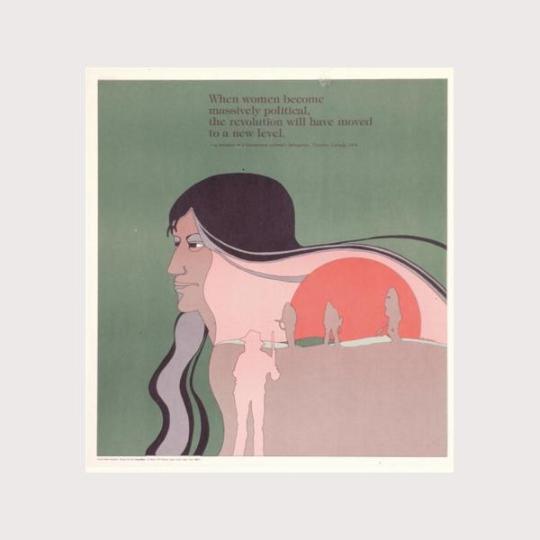
Ok. I’m going to define just one word that is associated with identity politics: intersectionality.
Intersectionality is a word that was coined by UCLA Law Professor Kimberlé Crenshaw back in 1993. That’s right people, the fourth wave of feminism actually consists of fifth rate renderings of ideas that are decades old.
In her article Mapping the Margins, Crenshaw wanted to describe how her clients, generally women of colour, were uniquely discriminated against on the basis of their gender and race. Feminism in general contended that women were victims of sexism, but Crenshaw wanted to point out that some women were doubly disadvantaged. Not only could they be victims of sexism, but also racism, and at the same time. In order to draw attention to this, Crenshaw used the analogy of an intersection.
In a 2016 Ted Talk Crenshaw clarified her thought process:
[She thought that] maybe a simple analogy to an intersection might allow judges to better see [Emma DeGraffenreid’s] dilemma. So if we think about this intersection, the roads to the intersection would be the way that the workforce was structured by race and by gender.
In Mapping the Margins Crenshaw states clearly that ‘intersectionality is not being offered as some new, totalizing theory of identity.’ Instead, the paper is a very thorough description of the various ways in which women of colour are disadvantaged before the law. It certainly provides good evidence for lobbying governments on behalf of these women. But the discussion that has happened on social media for the past 5 years has left Crenshaw’s work behind entirely. Her thoughtful analysis has been picked over and reduced to meaninglessness in 140-280 characters or less. Or it has been invested with far more meaning than she originally intended. Just one example of this can be seen from Ruby Hamad and Celeste Liddle’s description of it in an article for the Guardian:
As outlined by Kimberle Crenshaw, intersectionality is not so much something that someone “identifies” as, but a useful term that easily illustrates certain truths; namely that when multiple forms of oppressions meet, they create new, compound oppressions that are experienced acutely by those who belong to certain marginalised groups.
‘Certain truths’ is quite a stretch. I don’t think Crenshaw ever claimed such a thing. But hey, let’s exaggerate our language and re-post because why not.
You’d think that academics at the very least would have picked up on this and tried to dial it back a bit. But in her paper Intersectionality as buzzword: A sociology of science perspective on what makes a feminist theory successful, Kathy Davis points out that even the smart people don’t know what it means. Well, duh. It doesn’t mean anything more than what Crenshaw has already stated. But here’s the problem. In the meantime, other strands of feminist thought found something useful in the concept of intersectionality and took hold of it to aid their ‘project of deconstructing the binary oppositions and universalism inherent in the modernist paradigms of Western philosophy and science.’ Scholars like Judith Butler (whose article Gender Trouble remains one of the key texts for queer theory) ‘were all in search of alternatives to static conceptualizations of identity. Intersectionality fit neatly into the postmodern project of conceptualizing multiple and shifting identities…’
As such, the concept of intersectionality was hijacked and blown wide open. It is universally applicable but by implication, universally meaningless. Davis’ article concludes by saying:
‘In order to achieve its full potential, intersectionality is in need of a definition, a set of clearly demarcated parameters, and a methodology which would eliminate any confusion among researchers concerning how, where, and when it should be applied.’
As Eleanor Robertson recently pointed out in her excellent critique: we’re still waiting.
Meanwhile, the Internet is like INTERSECTIONAL FEMINISM IS LYFFFFFFF.
Meanwhile, Christians get caught up in the way that social media thoughtlessly presents identity politics as truth and to some extent let it dictate what they will or won’t say. If you are someone who has thought to yourself in the past year ‘I can’t say that because [insert identity qualifier in here]’ then tbh you need to get a grip on yourself. We are letting a foundationless theory determine our own discourse and it’s utterly ridiculous.
As T-Payne has said:
In popular culture, certain statements or ideas come to have a life of their own. They assume a legitimacy and truthfulness merely by virtue of their being repeated often enough.
!!!!!!!!!!!
We all want to re-post blogs about how we’re supposed to be in exile now. We could start by speaking in a way that shows we don’t play by the rules of identity politics. Because quite frankly, the game is a farce.
0 notes
Text
Saruman: literally me

I’ve been reflecting on my social media posts and comments, as well as conversations I’ve had irl. I’ve been wondering... am I inconsistent, and is this a problem? Is it the case that the lady who decries feminism doth protest too much?
For someone who is so doggedly committed to critiquing the movement, I can’t help but think like a feminist. I can’t help sympathising. I’ve found myself feeling and saying certain things over the past month that seem to jar with what I put down on paper.
I’ve been wondering how much of this is down to what I really believe (i.e. am I actually a feminist at heart and going against what I know to be right?), and how much of it is down to what I put into my head (i.e. if you spend all of your time reading feminists, your feminist consciousness will be raised whether you like it or not).
They say that you are a reflection of the company you keep. My closest friends and confidants are those who subscribe to similar theological views. But my online media is mostly comprised of left-wing commentators and cultural supplements. And truth be told, I spend more time in their company than that of anyone else.
I like to have access to lots of different opinions and ideas because I, like so many other Christian leaders these days, are utterly convinced that nuanced-ness is next to godliness. We want to avoid echo chambers and to be seen as reasonable and...
That’s all well and good. Not saying we shouldn’t dismantle our echo chambers. But it has recently occurred to me that I am not as in control of my attempts to stimulate ‘critical thinking’ as I thought I was.
I used to enjoy watching The Walking Dead because I found it fascinating to think through the human psychology of being stuck in an apocalyptic situation. As the series progresses you watch the mental and emotional deterioration of the characters as they become more and more desperate. Eventually they begin slaughtering zombies and one another with an animalistic urgency. But what really disturbed me was that I found myself cheering on the character who takes a pair of scissors and hacks away at a stranger in a murderous frenzy. In those moments, when I am made to feel a kind of blood lust that I didn’t know I was capable of, I feel that I don’t really know myself. It is disarming to find that my moral and ethical sensibilities can be reduced to nothing but clay for the potter.
I think that my online media consumption is creating a similar situation, but it is even more insidious because it is moulding me more slowly over time. I’ve imbibed a steady drip, drip, drip of ideas and it is only now - as I begin to notice my cognitive dissonance - that I am stopping to really consider it. I believe that to some extent it is helpful to follow different views. But not the way that I’ve been doing it. Everyday - a barrage on Twitter, on Facebook, on Instagram - all of these people who hold such strong convictions so markedly opposed to mine. The truth is, I am not in control of this. Is anybody really in control of this? Mark Zuckerberg and other media execs don’t even use social media. They’re not stupid enough to get high off their own supply.
I’ve rarely written a personal reflection on why I am wary of feminism. I’ve always tried to provide solid arguments from Scripture or from theory. But it’s not about Scripture or theory. Not really. It’s about the men and women we choose to follow. It’s about the writing we consume and meditate upon. It’s about our own ignorance as we run headfirst into the world thinking we’ve got this thing on lock. I say without apology that immersing myself in feminism has the very real possibility of turning me into someone else and I don’t like who she is. Admittedly, this is as much an issue with social media as it is an issue with feminism. Ought I to separate the two for the sake of nuance? Well, when it comes to the the fourth wave, there is no separating them. The only explanation for the rise of the complementarian feminist from basically nowhere, with more or less no critical reflection, is the subtle but powerful impact of social media. This is my reflection upon just one issue. Where else have we changed our minds without really understanding what the heck just happened?
I am incredibly grateful to my husband who is always so patient with my musings. I’ve continued to think on the warning he lovingly mentioned to me which is also the most Thom thing ever:
Saruman thought that he was going to study Sauron in order to destroy him, and look how that turned out.
It is such a perfect allegory. It is a warning to me as I wonder whether I’m heading down a path that will see me losing myself. And it is an encouragement. It is ok to pull back. My goal in this life is not to know every argument, every event, every piece of writing from the other perspective before everyone else and dismantle it (charitably, of course) in order to make God’s word reasonable. How ridiculous. How arrogant. It is not even my main goal to be reasonable (gasp). It is my goal to glorify God and given my double-mindedness, I’ve been far from where I should be.
If anybody wants me, I’ll be taking a step back.
0 notes
Text
Wendell Berry defines freedom
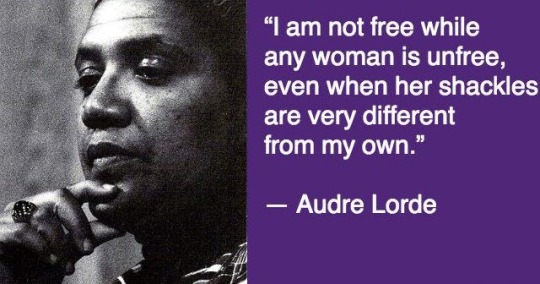
Really fantastic article by Wendell Berry: Faustian Economics.
It describes our world’s pursuit of wealth in terms of our perceived ‘limitlessness’. Despite the fact that we are creaturely and our world’s resources are finite, we assume that we will continue to grow in wealth, both individually and collectively. Further, this drive for progress is facilitated by technology and largely ignores community - the very thing that has any hope of saving as.
An awesome quote:
In our limitless selfishness, we have tried to define “freedom,” for example, as an escape from all restraint. But, as my friend Bert Hornback has explained in his book The Wisdom in Words, “free” is etymologically related to “friend.” These words come from the same Indo-European root, which carries the sense of “dear” or “beloved.” We set our friends free by our love for them, with the implied restraints of faithfulness or loyalty. And this suggests that our “identity” is located not in the impulse of selfhood but in deliberately maintained connections.
Berry is a Christian and this is a Christian sentiment. But something I have noticed recently is that identity politics actually seems to echo what Berry picks up on - freedom being found in relationships.
I’ve been trying to think through what is distinctive about a Christian approach to community given that there are some recent feminist examples of trying to unite women across class and racial divides. The #timesup initiative is pretty significant in its commitment to *all* women. But I suppose - it really is a commitment to *women* isn’t it? Its attempts at reconciliation only really do half the job (if that).
0 notes
Text
Philosophical antidotes to idleness #1

I found this documentary called ‘Sea of Faith’ which examines how modern thinkers have interacted with Christianity. It begins with Galileo and includes Freud, Marx, Nietzsche, finishing up with Wittgenstein (just to name a few!). It was written and presented by Don Cupitt, a philosopher of religion and theologian at Cambridge. It is a really helpful crash course in modern philosophy and even asks what the pastoral implications of these ideas might be given Cupitt’s background as a minister. It was produced in the 80′s and it looks like it’s straight out of the 80′s, but these ideas continue to dominate intellectual discourse today. For example I just started watching Jordan Peterson’s lectures on the Psychology of Biblical Stories and he says straight up that he is strongly influenced by Nietzsche, Jung, Freud, etc and his new ‘self-help’ book draws heavily upon their writing.
Worth a watch. Part 1 here:
https://youtu.be/jhXlnvYZZQs?list=PLVUIaMDAYwqjMlxhXDehb4k8Oqa5n5KAP
I’ve also been trying to get into Oxford University’s Philosophy podcasts. It’s so cool that this stuff is available for free online. It’s the first time I’ve really valued online education - it’s not the same as learning in person but it’s pretty cool to have access to quality resources.
I’ve listened to a couple of these lectures on Kant’s Critique of Pure Reason because I will never be able to read and understand it for myself:
https://podcasts.ox.ac.uk/series/kants-critique-pure-reason
And although we did a lot of this at college, I’m working through this series on critical reasoning, which is for mature aged students (enjoy everyone wanting to ask questions lol):
https://podcasts.ox.ac.uk/series/critical-reasoning-beginners
I also watched this biographical film on Michel Foucault who I want to study a bit more and this provided some helpful context:
https://youtu.be/xQHm-mbsCwk
I listened to this short lecture by Bertrand Russell which I’m pretty sure I read in uni but had on while I was doing the dishes. I wasn’t terribly impressed by it. “Who caused God?” first year arts student type stuff and misreading of scripture form the basis of his arguments. I know that the dude was freaking a genius. But the things of God are for those whom he chooses to reveal them, that’s pretty obvious.
https://www.youtube.com/watch?v=0F6J8o7AAe8
0 notes
Text
Your summary of who is in trouble in the world of feminism today
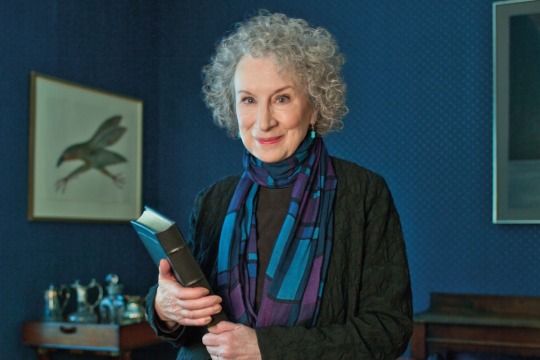
I am working on an article at the moment that I’m hoping will be published somewhere a little more legit than my tumblr. As such I’ve had my head in all things feminist more so than usual. Which is to say, a heck of a lot. You’ll be happy to know that I’m going to finish writing that article and will then promptly crawl into a hole and not say anything about it again for a long time. Lucky you.
Today’s developments:
Margaret Atwood is in trouble say whaaaaaatttt.
Atwood and her colleagues have signed an open letter questioning the dismissal of Steven Galloway, a creative writing tutor at the University of British Columbia. Galloway had been accused of sexual harassment, bullying and favouritism. After an inquiry by a judge lasting months, Galloway was found not guilty but was dismissed anyway. Atwood and co. were protesting what they believed to be a miscarriage of justice. Twitter has ripped into Atwood for ‘protecting’ an abuser and ‘silencing’ victims. Also, she compared the current movement to a witch hunt. Problematic.
She penned this response. It’s pretty great (and put me in my place), but she’s on the wrong side of feminism right now. The right side is now comprised of Reese Witherspoon and maybe 2 other people. Oh, and Oprah. How this will affect the release of season 2 of The Handmaid’s Tale remains to be seen.
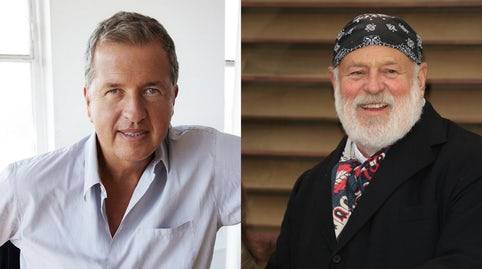
Two of the most famous fashion photographers in the world have been cut off by the arbiter of all things chic: US Vogue. This of course means that they are by extension dead to the whole world. Except for maybe France because, you know, France. Mario Testino and Bruce Weber have photographed the most famous and beautiful people in the world and until today I would have considered them unquestionably beloved by the fashion community. But the allegations have come, and the action has been decisive. I can’t help but think that the more revenue is at stake, the more swift the powers that be are happy to cut ties completely. Or maybe these advertising companies really do care about their employees’ emotional states and upholding the highest ethical standards. Lol jks photoshop.
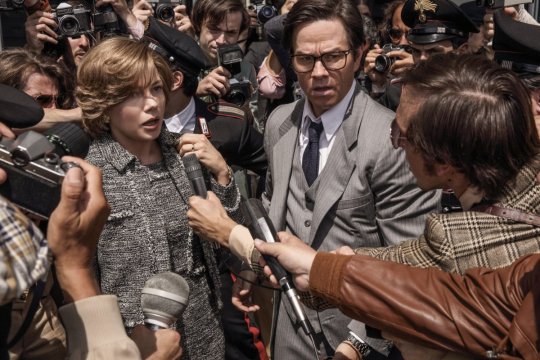
Finally, Mark Wahlberg and his agency have donated 2 million dollars to the Time’s Up legal defense fund. Wahlberg was in the cast of the movie All the Money in the World which is now infamous for reshooting all of its scenes featuring Kevin Spacey and replacing them with Christopher Plummer. Michelle Williams reshot her scenes for the sum of about $1000. Mark Wahlberg and his agency negotiated his reshoot fee and he walked away with 1.5 million dollars. This was leaked, gender pay gap something something, and basically Wahlberg did the only thing he could do if he wanted to work in this town again: donated the fee and then some to Time’s Up. Williams was very gracious about this and thanked Wahlberg for responding to the criticism by doing something constructive. As for me, I don’t understand why millionaire celebrities are asking us to donate to their fund. Do it yourself, you 1 per centers.
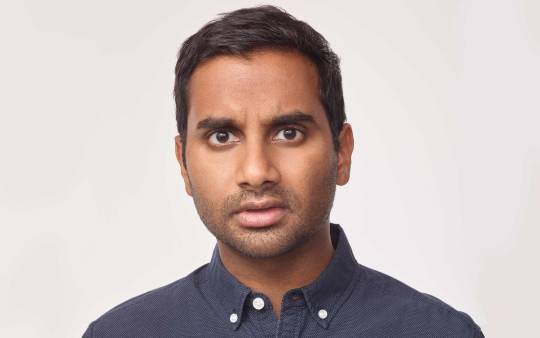
EDIT: Oh, and also, Aziz Ansari (self-proclaimed feminist) now has something to answer for. However, this story is not being covered by any legitimate media sources at this time. The story broke on some low-key website called Babe which proudly states that it is for ‘girls who don’t give a f**k.’ This is where it is going to get really murky. Is the movement going to take these young women seriously? The website alleges that a 22-year-old girl Ansari went on a date with was made to feel violated, and there are text message screen grabs to prove it. Aside from stretching the limits of who #metoo will protect, it will spark a heated conversation around the topic of consent. Is there a spectrum of behaviour? How do we discern what it is? Do we always just “believe women”? Is it more complicated than that? Is this where the movement begins to flail because it has gone too far? Dude, welcome to the mental/emotional whiplash of working out your ethics in 280 characters, moment to moment.
0 notes
Text
Social media, outrage, and the new morality
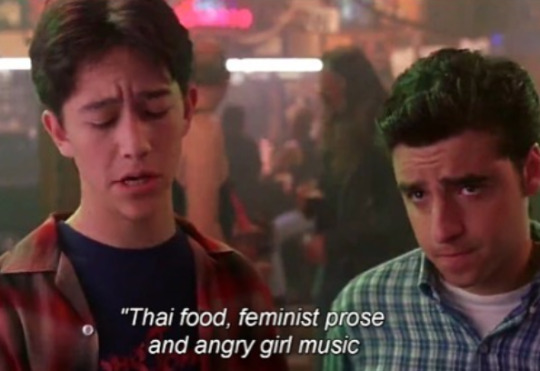
Have been feeling angry. Read some stuff.
Scholarly:
1) Emotion shapes the diffusion of moralized content in social networks
An NYU study which found that Tweets with moral-emotional content were the most likely to be retweeted and this has implications for how our morality develops.
2) Moral outrage in the digital age
A Yale professor explains why we are much more likely to express and share outrage online.
Articles:
1) The problem with #metoo and viral outrage
Basically summarises Yale professor’s comments
2) What motivates moral outrage
Short clip:
1) Why inequality and injustice makes us - and our brains - so angry
Am disturbed by the confirmation that emotional content is what gets likes and shares. This does seem to indicate that whoever is angriest, wins. Their morality is diffused much more thoroughly through cyberspace.
Am rebuked by the findings that sharing outrage is often a means of reinforcing your reputation amongst others more than anything else.
I really don’t know what this means for the future of Christian communication. But the first study I link to certainly explains why Babylon Bee articles get the most traction. The titles of those articles are the most emotionally charged of all the conservative evangelical blogosphere.
0 notes
Text
A brief survey of women who have defended men in the #metoo movement

Edit: This blog gets super messy towards the end, but let me remind you, this is a site for first draft ramblings. You will have to sort the sense from the nonsense if you proceed.
On November 17th, 2017, indie writers and feminists Lena Dunham and Jenni Konner made a surprising move: they defended one of their male friends who had been accused of sexual harassment. The #metoo revelations had barely begun to subside when they released their statement and the Internet backlash was swift. It didn’t matter that Dunham and Konner knew this man and his situation personally, it didn’t matter that they were willing to stake their reputations on his innocence: this was a moment to ‘shut up, listen, and believe.’
Dunham has always been an object of Twitter’s contempt. She is ‘too white’ and ‘too privileged’ to be taken seriously. I considered this attempt at defense another one of her missteps, and I did not expect to see anything like it again.
I was wrong. A week or so later I was completely floored to see a similar statement from Tamika Mallory on her Instagram in support of Russell Simmons. Simmons is a record producer and activist who was also accused of sexual harassment. Mallory is an organiser of the Women’s March on Washington and a credible voice in the grassroots feminist movement. Whereas Dunham is constantly mocked for her lack of self-awareness, when Mallory speaks, intersectional feminism listens.
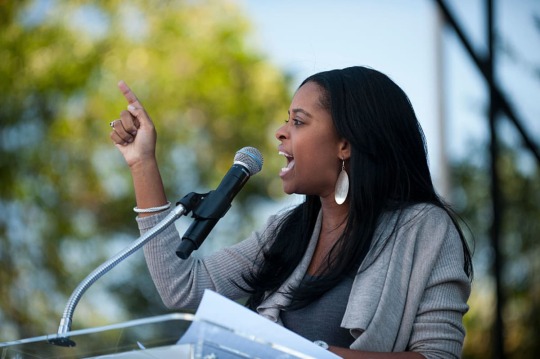
Mallory was not so naïve in her message in support of Simmons but the tone of her response was marked by deep sadness and regret. She spoke as someone with her hands tied. She spoke ambiguously when she said that the situation is ‘complicated’, she testified to Simmons good character, and she spoke of his response to the allegations as ‘demonstrating leadership.’ She offered a message to the woman who accused him, hoping that she and many others find ‘peace’ and ‘resolve’.
A similar public expression of sadness was exhibited by comedian Sarah Silverman who addressed the behaviour of her long time friend Louis C.K. She denounced his behaviour, and yet struggled to reconcile his actions with the reality that she loved him anyway:
I love Louis, but Louis did these things. Both of those statements are true... Can you love someone who did bad things? I hope it’s OK if I am at once very angry for the women he wronged and the culture that enabled it … and also sad, because he’s my friend.

It has been jarring to see these reactions which show tender disappointment in a friend, against the backdrop of the pain and anger of women generally which has bled through social media. Amber Tamblyn’s piece in The New York Times seems to sum up the mentality of the hive mind: I’m not ready for the redemption of men.
But what if we’re not just speaking of men collectively, what if ‘men’ becomes ‘this man’ and ‘this man’ is someone I have done life with, and loved, as has been the case with Dunham, Mallory and Silverman? It’s too big and horrible a thing to simply forget and move on, regardless of the strength of the friendship. Genuine love seems to want to entreat forgiveness, but who absorbs the pain? It would fall to the the women who suffer to absorb the consequences. Which begs the question, are the men who have perpetrated these crimes really allowed to move on after a show of remorse and a famous friend to vouch for them? Is this really a workable solution? No. It isn’t. Not for anyone.*
It seems that the only way forward, then, must be a ruthless purging: the guilty are punished and that punishment is complete and final. There is, quite simply, no one who can pay for that wrong but the man who perpetrated it.
But, this doesn’t seem like a workable solution, either.
I read a review of a book on a popular Christian women’s website recently which suggested that contemporary Christianity ought to move on from a ‘traditional rendition of the Gospel in terms of substitutional atonement’ because it is ‘underwhelming.’ Firstly, I unfollowed that website. Secondly, don’t listen to anyone who even suggests such a thing. A gospel that removes the atonement removes Jesus, and removes any genuine grounds of hope we have to offer the world.
#metoo has demonstrated that the part of the gospel that we have always been needlessly embarrassed about is exactly what makes it so powerful. Judgement is necessary. Those who sin ought to be judged. And yet in Dunham, Mallory and Silverman, we also want to look beyond judgement to reconciliation with those whom we love. But how can this be possible?
There is evil in this world, but it is not always external. It’s internal. Those closest to us, whom we love, are guilty. But more than that, we ourselves are guilty. I know that the response to this kind of analysis is to warn me against trivialising the stories of survivors because this is the ‘time for listening and amplifying voices’. But there is always patriarchy for those who wish to see it. If we have to wait for injustice to stop before we can speak, we may as well give up now. We cannot keep apologising as though there *will* come a day when sin will stop being a part of our earthly experience.
Far from minimising the pain of women, and allowing perpetrators of violence a free pass, the biblical description of sin enables us to grieve more fully the wrongs that have been done. We can only truly understand the devastation of our emotional and physical wounds when they are understood against the backdrop of the cross. Violence done by one human to another is violence against God. It is not merely an issue of inequality, but divine transgression. If we fail to locate this hurt and pain within its wider context then we become like everyone else in continuing to perpetuate anger and glossing over the hope that we have.
Sin, rightly understood, means that the nature of judgement can rightly be understood. We are guilty before God, and he is angry at our sin, and right to punish us. We feel the necessity of justice when moments like #metoo hit. Yet, God loves us. He demands justice, and he loves us. Both of these things are true. And this extraordinary paradox is seen in the death of Jesus Christ on the cross. Jesus’ death, his atonement for sin, is what makes real forgiveness possible. It’s what gives Christians a reason to move forward, and what ought to give us the confidence to speak into a moment like #metoo.
Again, I find myself looking at a world that is scrambling to get it together. We could spend all of our time apologising, or we could get back on the offensive and preach what we believe like we actually mean it. I intend to, at any rate.
*Although I don’t elaborate on it at this point because I’m leading up to something, the answer is yes, forgiveness does require one to absorb the pain. It is in fact, the only way to move forward. I believe that the reality of the cross means that forgiveness is no longer cheap, but it doesn’t make it any less painful in practise.
0 notes
Text
That time in 2010 when I decided I was a complementarian

Image by Jimmy Marble.
A blog I wrote on June 28, 2010:
This post is going to be painfully long so I will begin with this disclaimer: it is for my own benefit. I have summarised the main arguments of Claire Smith’s talk on 1 Timothy 2 from the Different by Design Series. It is an excellent talk and very easy to listen to. I love good theology and Claire delivers it. The complementarian exegesis makes beautiful sense of this passage and the ideas and arguments identified by Claire are consistent throughout the Bible. I have not had this sense of satisfaction when considering the egalitarian arguments. Thinking about this has been a real brain stretcher for me over the last few months. Actually, I started mulling this over about a year ago now. I think I may have finally come to a decision and this summary of Claire’s talk will explain why.
Firstly, Claire begins with an interesting caveat that we should be aware of when approaching this passage:
Our culture influences our reading of the text and many of the difficulties that we find, might exist because of our culture and our personalities but not because of the text itself.
I think that many of us who struggle with this text really do need to first be willing to realign our thinking with Scripture rather than letting previously entrenched thoughts and ideas which are not necessarily biblical, influence us. It seems as though a person could just pick a side they prefer and then find the arguments to substantiate their choice. Honestly, a big part of me would love to believe that women should have care over their own congregations and preach to them, but these thoughts are not in line with Scripture. They’re just not. It doesn’t surprise me either because so much of the Christian life involves defying social and cultural norms. There is a part of me that wants to fight for this perception of total equality but by the grace of God I want the other part of me to win out – and that’s the side of me that accepts the teaching of the Bible and strives to bring my life and thinking in line with it.
I do not think that the following verses add anything to the debate, I just wanted to share what Claire had to say about them in regards to the original translation because I thought it was really interesting.
V 3-6: This is good, and pleases God our Saviour, who wants all men to be saved and to come to a knowledge of the truth. For there is one God and one mediator between God and men, the man Christ Jesus, who gave himself as a ransom for all men – the testimony given in its proper time.
I’ve never been particularly miffed at ‘men’ being a blanket term for humankind, but I know it can be a sensitive issue. Claire explains the Greek terms that Paul uses in these verses and the passage as a whole and what seems at face value to be ‘sexist’ or exclusive language is actually inclusive if we consider the original text. Now in referring to men in verses 3-6, Paul uses the generic term anthropos which is not at all gender specific but which in Greek denotes all of humanity. The use of this term serves to emphasise the commonalities between men and women: the predicament of sin and the need of a saviour. Interestingly, the man Christ Jesus is also referred to using the same generic term anthropos instead of the gender specific title which consolidates the idea that he is a representative of all people, male and female. The use of anthropos in this context therefore indicates rich, inclusive language. It is only when Paul begins to address the issue of how each gender should conduct themselves in worship that he reverts back to gender specific terms.
V 11-12: A woman should learn in quietness and full submission. I do not permit a woman to teach or to have authority over a man; she must be silent.
Again there are interesting instances of language here but this blog is going to be long enough as it is. What I will note here is Claire’s explanation of submission. Submission is a common Christian concept and is vital to the life of faith. But in this context what are women called to be submissive to?
Basically, they were to be submissive to what was taught and who taught it. In the same way as a woman’s behaviour and dress are to display a quiet decorum (V9-10), their learning style is to be the same. It does not mean that women are to be subject to all men, but only to those who are given the authority to teach Scripture, while they are teaching. The attitude of submission was to be expressed in certain relationships, such as within the public worship context. Claire notes that various bible passages do encourage women to teach, namely Colossians 3:16 which calls men and women to teach and admonish one another. However, these examples are indicative of informal, private teaching and never refer to the public teaching of Scripture by women. Paul allows women to do one and not the other, obviously they were different in his mind. It is clear then that what happened on a one-to-one basis was very different to the public transmission of God’s word.
V 13-14: For Adam was formed first, then Eve. And Adam was not the one deceived; it was the woman who was deceived and became a sinner.
So the question is – why? Why are men only allowed to authoritatively preach the word of God at a public gathering? Paul answers this by appealing to Genesis. He gives us two reasons:
1) Man was formed first
It is in Genesis that God’s intentions for mankind are first made clear. He creates the world, He creates man and everything is good. However, God declares that man being alone is not good and so he makes woman. Both are given a divine mandate but have different responsibilities. Man is the firstborn; he has temporal priority and inherits the responsibilities that come with it. Woman is made later and comes to help him fulfil his role.
2) It was not the man who was deceived but the woman, who then became a sinner
Here Paul has only repeated the story of Genesis 3, but he finds implications that we may not have expected. At the fall, Adam and Eve both sinned but they sinned in different ways. Instead of accepting the leadership of the man, Eve listened to the serpent, ate of the fruit and led him to do the same. The man sinned by abdicating his responsibility to lead, thereby following the woman and disobeying God. God has a clearly set out pattern for relationships between men and women to which the principles of leadership and submission are inherent and still relevant today. That Paul draws on creation to provide the rationale for men having the authority to teach means that this pattern transcends time and culture and thus the instructions given at Ephesus couldn’t have been just ad hoc and particular to those circumstances only.
Therefore, basing his argument in creation, Paul’s instructions are that male leadership and female submission are to play out in church. Women are not to usurp the male authority provided but willingly accept the differences in responsibilities between men and women through their attitude to learning and not teaching or having authority over men. They are to be submissive. I wish this didn’t come across as such a dirty word because submission is the voluntary and willing acceptance of the leadership and responsibility of another. It doesn’t mean that one is oppressed, restricted, limited. Women are no lesser because of their call to submission, it simply means that their contribution to the church will be different. Unfortunately in the 21st century context that is rife with feminist ideals, it is the woman’s battle to be content with what the bible says, and follow the commands of a good and loving God who knows what is in our best interests.
V15: But women will be saved through childbearing – if they continue in faith, love and holiness with propriety.
Verse 15 brings to a close Paul’s argument in V11-14. Childbirth is referred to because it is a representative function for the differences between men and women. It is a shorthand way of speaking about the role of women. Therefore, Paul is encouraging women to be content with their role in relation to men. Again, bearing children is a function that is transcultural and further supports the view that Paul’s instructions here are relevant for the universal church. Now this is not suggesting that all women have to have children to be saved, they may be married, they may have children, they may not. Whatever the case may be, we are to be content with being women and accept the patterns for relationship between men and women that have been instituted by God.
I think I’ll leave it here for now. Claire briefly addresses some of the egalitarian arguments – such as the appeal to Galatians 3:28 and the potentially ad hoc nature of the instructions and in my mind, she successfully dispels them. I’m happy to keep reading and thinking but at this point – I’m going to officially adopt complementarian theology as my own position. I do not believe that women should be allowed to preach to a mixed congregation. This is not because I believe women to be incapable or lesser. I am full of admiration and respect for the godly, gifted and fiercely intelligent women I know and have heard preach – Claire Smith being a stellar example. Further, let me say loud and clear that my adherence to complementarian theology does not mean that I am a doormat, nor do I feel as though I am being oppressed by the men of the church. My ultimate authority is the bible and I am submitting to God who revealed himself to me through it. He has given me the responsibility of teaching and training other women, the children I may have and of supporting a husband if He should provide one. I defy anyone to tell me that my role is lesser or incomplete because I cannot step into a pulpit. Submission is my lot and by the grace of God, I accept it.
0 notes
Text
Looking for answers in the aftermath

Jia Tolentino, in The New Yorker:
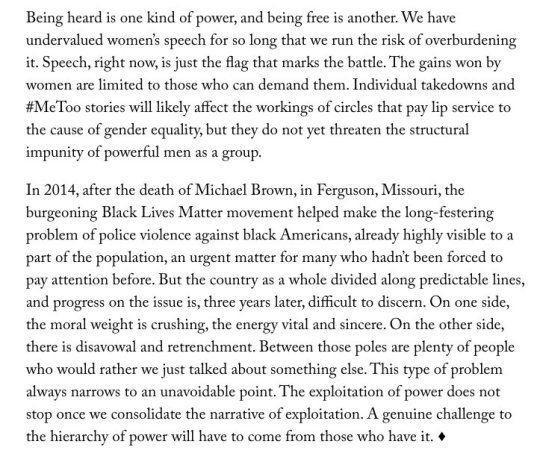
I'll see your challenge to the hierarchy of power, and raise you a complete, utter, total recalibration of reality wherein the Lord Jesus Christ defeated sin and death and was raised to life. The gospel cuts right to the heart of this, and yet instead of preaching it confidently, we keep apologising as though there will be an earthly day when sin will not be apart of our experience.
0 notes
Text
Tracking #metoo
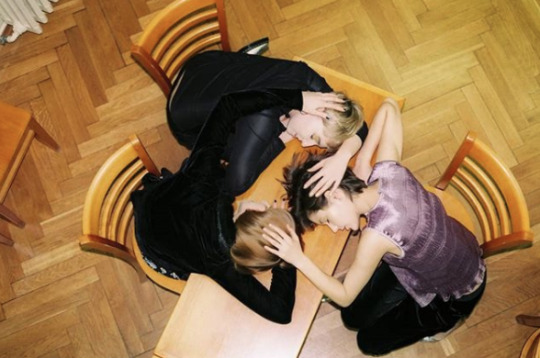
Image by Lukasz Wierzbowski
Elizabeth Farrelly in the Herald: The way to stop the Harvey Weinsteins of the world isn't #instacleavage
This cannot be news to us. Crikey. It's Hollywood. We know Weinstein isn't a sex addict. He's a standover man. And he's not unusual, except in getting outed. The evident answer is feminism: equal pay, equal rights, equal respect. That's so simple, although apparently still so frightening. But broadcasting your privates to the world? #instacleavage? #instabooty? C'mon loves. That's not feminist. That's buying the Big Boy bullshit, big time. That's getting screwed.
The most popular comment on this piece with 193 likes:
Feminism is recognising that women have the right to make their own choices without bring insulted and called bimbos. I can’t fathom why in an article with the title referencing Weinstein, you’ve somehow laid the blame on women doing what they want in their free time. This article talks about feminism, but I don’t think this word means what you think it means.
Basically every comment reiterates this sentiment. So basically, men need to repent and women have zero, zero responsibility for their behaviour in this.
This is not a workable model for moving forward.
This article in the Guardian by Jessa Crispin got a lot of hate: Liberal men think they know feminism. They really don't.
Crispin states that men who call themselves feminists are often trying to manipulate women. They need to have a ‘spiritual awakening’ in their encounter with feminism for it to be meaningful. The ending was particularly bleak:
The reports of harassment and assault will continue to roll in, and up and coming predatory men will replace the fallen predatory men. And men will continue to be surprised to discover that under their feminist T-shirt beats the heart of a predator.
A lot of comments decried the continual ‘moving of the goalposts’ as to what constitutes genuine subscription to feminism. Crispin is an outsider, her voice is not particularly authoritative within the wider movement, but I find it hard to see how this kind of fear will be managed. In the past few days all we have seen is women describing their stories in harrowing detail, men being given 10-15 points to put into practise in order to be a better person, and apparently this will be enough to remedy the darkness of the human heart.
I was fascinated to see a comment by one of my FB friends who works for a high profile NGO. He stated that he normally stays silent in these situations until he can come up with a ‘theoretical solution’ to propose in order to move forward. He said he couldn’t come up with anything. Indeed.
The Christian response to this has been underwhelming. Eternity published this needlessly horrible article describing situations of assault. The title claims to recount situations of abuse of Christian women by Christian men. These are clearly not Christian men. The article provides no biblical framework, no solution, no way forward. This article is unhelpful and unbiblical and does nothing but say to the non-Christians that we have as little faith in our Jesus as they seem to do.
This article at FHE at the very least provides a gospel framework for working through anger. Generally speaking though, I disagree with basically everything FHE posts. This is a rare exception.
0 notes
Text
Intersectionality, something something

Image by Ikran Abdille.
Super helpful analysis here from Eleanor Robertson: Intersectional Identity and the Path to Progress.
This is not going to synthesise. I’m going to unashamedly copy/paste/highlight for my own benefit.
Nobody knows what intersectionality means... It’s not just me, either: the scholar who coined the term, UCLA law professor and critical race theorist Kimberlé Crenshaw, said in 2009 that she is ‘amazed at how [intersectionality] gets over- and underused; sometimes I can’t even recognize it in the literature any more’.In Crenshaw’s 2016 TED Talk on the urgency of intersectionality, she explains the problem like this:
The challenge that I faced was trying to figure out whether there was an alternative narrative […] so it occurred to me, maybe a simple analogy to an intersection might allow judges to better see [Emma DeGraffenreid’s] dilemma. So if we think about this intersection, the roads to the intersection would be the way that the workforce was structured by race and by gender.
So far, so good. If Crenshaw were the final word on intersectionality, the concept would be a useful metaphor to capture the awful real-world shortcomings of anti-oppression efforts based on rigid categorical abstraction. But, as she says above, hers is not the last word, and her work has receded almost entirely into the background.
In his 2015 lecture ‘Capitalism, Temporality and the Crisis of Labor’, University of Chicago historian Moishe Postone makes this comment:
The theoretical focus on agency and contingency in recent decades is as one-sided as the structural-functionalism it superseded. If the latter achieved a currency during the high tide of state-centric capitalism, the former has done so during the neoliberal epoch. Neither approach schematised their relation to their own historical context.
What Postone is saying here, I think, is that the workerism of the early to mid twentieth century and the postmodernism of the late twentieth century both had their unacknowledged blind spots, their unquestioned assumptions about what is possible and desirable. These assumptions reflect the time and place in which they occurred.
As I mentioned earlier, this accusation is frequently levelled by contemporary Marxists and socialists against identity-political concepts such as intersectionality and other products of the postmodern turn. This period was characterised by a rejection of totalising theories or ‘metanarratives’ such as God, universal truth and, crucially for this discussion, twentieth-century Marxism, with its insistence on a discoverable trajectory of history and the universality of the industrial working class. Critics of postmodernism point out that this is a sort of despairing retreat into localism after the collapse of existing socialism and slow, seemingly inevitable decline of social-democratic state capitalism.
Without some kind of totalising theory, they argue, we are simply flailing around in the dark, condemned to docility because we cannot recognise where we stand in relation to power and history. This is reflected in postmodernism’s unconscious acceptance of its own metanarrative: ‘there are no meta-narratives’. There is no shared understanding with which to make rational decisions about the best course of action to pursue, no way to imagine what the future might hold. At best we can achieve cosmetic or local change; at worst we become atomised and ignorant, unable to understand why we are acting as we are, apart from shallow moralism and unexamined intuitions. We act, in essence, as though we believe this phase of capitalism when it tells us we have reached the end of history.
Well, this explains why I seem to agree with Helen Razer’s critiques so much. We each believe in a totalising metanarrative.
Similar, but not quite as insightful critique here by Ruby Hamad and Celeste Liddle: Intersectionality? Not while feminists participate in pile-ons
“As outlined by Kimberle Crenshaw, intersectionality is not so much something that someone “identifies” as, but
a useful term that easily illustrates certain truths
; namely that when multiple forms of oppressions meet, they create new, compound oppressions that are experienced acutely by those who belong to certain marginalised groups.”
Dudes, you’re operating within a post-modern framework. What do you mean your theory easily illustrates ‘certain truths.’ Fascinating how what Crenshaw put forward as an analogy is now being posited as absolute truth.
0 notes